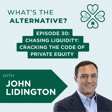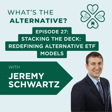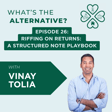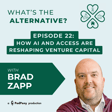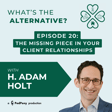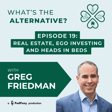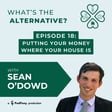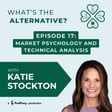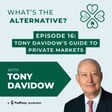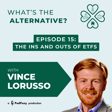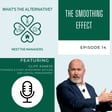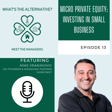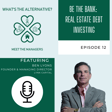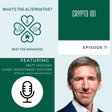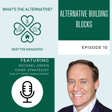Kane Anderson's Investment Philosophy
00:00:00
Speaker
The return of capital, then the return on capital, cash flow oriented, right? Relative value, you know, discipline, patience. that is That has 100% shaped how we do things here at Kane Anderson.
Introducing 'What's the Alternative' Podcast
00:00:20
Speaker
Welcome to Bonnarooin Capital Management's What's the Alternative podcast. Join host Shana Orzek Sissel, the queen of alternatives and founder, CEO of Bonnarooin Capital Management as she interviews leaders in the alternative investment space.
00:00:37
Speaker
Learn more about their firms, their passions, and about the many different ways investors can use alternative investments to add value in their investment portfolios.
David Selznick's Expertise in Real Estate
00:00:52
Speaker
to another episode of What's the Alternative where we talk portfolio managers and investment professionals about different strategies in the alternative investment space.
00:01:04
Speaker
Today we have for us a great guest ah from one of our newest platform partners here at Bonran, We have David Selznick from Kane Anderson Real Estate. He is the chief investment officer at Kane Anderson and also sits on the investment committee and the board. He is um the individual who really um drove the beginning of Kane Anderson's real estate platform and specifically has expertise in medical and senior housing.
00:01:34
Speaker
um So we're really excited to have David with us today. We've done a lot of discussions about real estate, but we haven't really talked about commercial real estate and industrial, medical, any of that. It's been residential and ah the debt side. So we're excited to have you with us, David.
00:01:48
Speaker
Great to be here. So
Selznick's Career Roots and Influences
00:01:50
Speaker
why don't you tell us a little bit about your background, how you um got into this space, um where you kind of cut your teeth as it pertains to real estate investing, and and we can dive into some of the ah great things that Kane Anderson is known for.
00:02:06
Speaker
Sure. um So one, you know I'm from Cleveland, Ohio, so being a Midwesterner, you know, culturally, um we're win-win people.
00:02:17
Speaker
We actually believe that zero-sum transacting is not the way to do business and that you can actually be thoughtful and transparent where both sides can have a win.
00:02:29
Speaker
And I've sort of a very, my whole life, I've sort of feel like I've been super lucky. and And it sort of started as a kid, my best friend's dad He was a real estate guy, owned a bunch of apartments and some retail centers.
00:02:45
Speaker
And so, you know, we, me and my, my, my close friend, we, we painted his apartments. We schlepped, you know, we landscape, we move appliances.
00:02:56
Speaker
So that it was like a good experience to be in the apartments doing work as a laborer. But, you know, when we would come home and talk to his dad about, his job and what he does and a few things that as a young person were pretty telling.
00:03:14
Speaker
The first and foremost was he was, you he seemed to have yeah a lot of success. He would travel and I'm like, man, this is pretty, this is pretty cool.
Cash Flow as a Risk Mitigator
00:03:24
Speaker
And he said, yeah, you know, when I, when you buy these properties, yes, you have to operate them, but think about it.
00:03:31
Speaker
you You could be, you know, in Paris having dinner with your wife and, you know, people are paying you rent. I'm like, that's pretty good. i love that idea where someone can pay me rent so I don't have to work an hour to earn an hour.
00:03:47
Speaker
Right. That oh, that like is a younger person. like, I want to do that. And then the other thing was is that the importance of cash flow and how cash flow is a big mitigate to risk, right? If you can generate you know income and grow income over time to the things that you own and operate,
00:04:08
Speaker
there's no better mitigate your sale price or your you know anything that happens between point A and point B. Because when you buy a so piece of stock or you buy something that doesn't generate income, you're solely dependent on where you sell it at.
00:04:26
Speaker
So that simple idea of, hey, if I own something for five or ten years, if I cash flow, you know, they call eight to ten percent a year after ten years, my whole investment.
00:04:36
Speaker
Right. I've gotten all my money back through cash flow. So that sort of idea really sort of shaped sort of how I think. And then when I went to school, I went to business school. I had a master in finance. I took a, um you know, I was a JD.
00:04:54
Speaker
um it was a really a master's real estate finance but like i went to school for this now i didn't know what i would ultimately do i started out working in real estate banking but i really modeled my educational you know from my friend's dad he was a lawyer by education not by training or not by know his profession and so The way you think, the way you communicate, that all was shaped during you know my schooling.
Lessons from the GFC and Business Ventures
00:05:28
Speaker
And then i was in banking until the the GFC. And then in 09, I left, started my own investment business. Very, very low opportunity cost.
00:05:39
Speaker
you know I had my wife and I were just married. I had a dog, a mortgage, no kids. And in banking, nothing was happening as you remember. I don't know if you were around then. I was, actually cut my teeth on the alternative side.
00:05:55
Speaker
don't know why I'm reading that phrase a lot all of a sudden. But yeah, I started my journey in the alternative space during GFC. I was working for Russell Investments Hedge Fund of Funds as a quant analyst on the equity side.
00:06:09
Speaker
And started there in July of 2007 and went through the highs and lows.
00:06:17
Speaker
Right. I knew you were younger than me, but you had a couple of years before it all sort of was the most surreal experience. Well, all of us, you know, you'll never forget where you were when Lehman went down. yeah so Exactly that. so i So I so I've been in the business since the tech bubble burst.
00:06:36
Speaker
So that's when I started. Um, but exactly right. I remember exactly where I was when bear went down. Cause that was the day I got laid off from Russell. And then I know exactly where I was when Lehman melted down because it was working for an r RAA outside of Boston. And all of a sudden that's when all the media that I do became such a big thing. i was contacted by one of the local TV stations to come in and talk about what was going on. And that was what September.
00:07:02
Speaker
of OE. And I remember being on a call the Friday before with a really famous portfolio manager from Loomis Sales and him talking about how everything was going to be okay then coming into the office on Monday and like the whole world had ended because Lehman kind of went under over the weekend.
00:07:22
Speaker
it was It was unbelievable, right? And so
Post-GFC Investment Strategies
00:07:27
Speaker
you know we when we think about those experiences and you know i started my own business and fortunately you know things worked out really well i met so many of the people that i do business with today during that sort of that 08 to 2012 period of time i i joined kane in 2012 i really spent a lot more time with al rabel my partner during that period of time, um as he was really launching Cain, we we looked at a lot of stuff together and so forth. But that imprints in your brain how downside protection is so important. Yes, that's why i always talk about, that's why that's when I became like you know a preacher for all things, alls have been an evangelist, if you will, because of exactly that reason.
00:08:16
Speaker
Exactly. And so like the utilization, how you utilize leverage, how do you make this investment decisions, the return of capital, then the return on capital, cash flow oriented, right?
00:08:29
Speaker
Relative value, you know, discipline, patience. That is that has 100% shaped how we do things here Kane Anderson. It's really interesting you say that because you're talking about it as it pertains to real estate and that a really advantageous period to get into, um to have your own investment firm focused on real estate because real estate was kind of one of the key drivers of the GFC and everything just
Real Estate Opportunities Post-GFC
00:08:58
Speaker
And you could jump into the market and have these really fantastic investment opportunities that were trading well below their their value because the market just imploded and i didn't touch real estate at that time but i actually made a ton of money with a bet on mlps for the same thing cash flow oriented um you know really beaten up.
00:09:24
Speaker
Everything was repriced. Almost all of it was trading below net asset value. And so you could just make a killing on it. And real estate was another place that is. So your timing was impeccable, even if at the time it probably felt pretty scary.
00:09:39
Speaker
Well, I will say, yeah one, Kenny Anderson, it the they're big you know we've been big MLP investors forever. So for sure. And that's where the value orientation, yeah that's one way have you know, that value manifested itself for sure.
00:09:58
Speaker
In real estate, um it was clear, if you can get something done, you are going to win. You just had to get it closed, right? And so, um you know, I was doing a bunch of smaller things, some non-performing loan portfolios, senior housing here, you know, ah bought, you know, five or six apartment buildings, smaller,
00:10:23
Speaker
value add type deals. And then the bigger deal that i during that period of time was in early 09. I started working on this 600 unit apartment complex. I was, was I was in, i lived in Chicago and um I very early concluded that the seller was nuts and there was no way he was out of the money.
00:10:47
Speaker
ah had to go to the lender. So I, after months of dealing with how to get to the loan, how to get to the lender, I finally was able to um get to the lender and figure out how to get it under agreement.
A Pivotal GFC Real Estate Deal
00:11:03
Speaker
It was a class F deal, maybe D minus. Okay. But in a B plus a location, great location, but the previous owner just let it go. It was terrible.
00:11:15
Speaker
So um but we were buying it for 20,000 units.
00:11:23
Speaker
So anyhow, long story short, three days before closing, I had my money, my uncle's money. And when I say my money, I had every it was everything but $10,000. OK, my wife had no idea what I was doing.
00:11:39
Speaker
And i was i this deal was too good. My uncle, um he and I were hard money, a million dollars. And three days before closing, my my partner, so I had a ah money partner, they walked. And so my main LP said to me, okay, I'll lend you money.
00:12:00
Speaker
I'll lend you money for 90 days. You take no fees. I know you could do this. Make me proud. 88th day, replace my GP partner.
00:12:12
Speaker
The deal ends up being a 4X. But there was a 90 day period where I thought I might have lost all of my money and my uncle's money because I had find a replacement for the the the guys who left me at the altar three days before closing.
00:12:28
Speaker
So that was that time period. If you could get it capitalized, you're going to win.
Kane Anderson's Strategic Growth
00:12:34
Speaker
but it took everything and then some to get these things closed so anyhow so that was that was that time period and then i joined kane in 2012 um we we had 750 million earned management we are primarily student housing uh al and i see the world the same way downside protection oriented and then we you we wanted to build this all-weather business that was relevant and active and outperforming in all cycles.
00:13:04
Speaker
The that were going to do that was through not only equity, but at a debt business over time, diversify not into a generalist, but as an alternative investor in low correlated sectors like student housing, right? Good times are bad, people go to school.
00:13:21
Speaker
Senior housing, good times are bad, people need homes, senior homes to live in. Medical office same sort of thing self storage lightened up these sorts of things have a lot of resilience that are not correlated to the broader economy and if you look at demand which this is a very important point in real estate Being a demand-centric investor is critical because supply is inelastic.
00:13:48
Speaker
You have surges of supply from time to time, but if you have robust structural demand, that supply will get absorbed over time. It may not be you know as you anticipated, but the binary element is not there because demand will always help you through.
00:14:08
Speaker
any kind of supply. If you have a one-horse town or two-horse town or anything that is very episodic or has, you know, like, for example, that when there was this big fracking boom in the Dakotas and parts of Texas, there needed these apartment buildings for all the workers.
00:14:27
Speaker
But if you if you thought about it, what if the efficiency started to increase or what if, you know, the oil, you know, the oil reserves became much less. Right. You would not need those apartments.
00:14:42
Speaker
And so what happened is that that was very binary. The need for those apartments dropped off a drop off cliff. And because of the efficiency and technology, they needed a fifth or something like that of the workforce.
00:14:56
Speaker
So we stay far away from those sorts of things. And we focus on apartments across street from University of Michigan, Wisconsin, Florida, those sorts of things, right?
00:15:08
Speaker
Healthcare systems that you go to the doctor, you need a knee replacement, you need you know any kind of cardiovascular services, oncology, those sorts of things.
Current Trends in Senior and Student Housing
00:15:19
Speaker
That's what we do. And we do it through our opportunity funds. We do it so that's your, you know, two times your money, 20% returns. And then we have an open-ended core fund, which is low leverage, long-term, 10% returns.
00:15:34
Speaker
And then we have a debt fund series where we're making loans and buying loans, all in the same downside protected, low correlated sectors. And so, you know, that started in 2012. Fast forward to today,
00:15:48
Speaker
you know, we went from 750 million under management to, you know, we're 18 million under 18 million under management today. In these things that we do.
00:15:59
Speaker
And I will say when, you know, times like, you know, when COVID hits, right, when COVID hit, we we weren't on the sidelines, we were leaning in and we, you know, we bought or you know we bought or lent money on $5 billion or so of real estate.
00:16:23
Speaker
So anyhow, that is how we built we built this business to but not only be all weather, but be able to really lean in in times of dislocation. And so these sorts of markets today, when you have so much noise about tariffs, um yeah geopolitical risks,
00:16:40
Speaker
all those sorts of things that creates some inefficiency or illiquidity, that's when we're at our best. I'd like to learn a little bit more about opportunities today. So we talked about the financial crisis and you talked about how you approached the market then.
00:16:54
Speaker
And again, that was early on in your career. And you know obviously you have a vast more resources, capital and experience behind you. And talk a little bit about opportunities today, because I think a lot of people and a lot of our listeners, you residential real estate, everybody kind of understands because we all need a place to live.
00:17:14
Speaker
But you guys really work in markets that aren't necessarily the ones we talk about so often. And in a world post COVID where the real estate markets are really different than they were pre COVID,
00:17:26
Speaker
Where are you finding opportunities and how do you approach um your investment decisions and potential investment opportunities um for the funds that you are managing?
00:17:38
Speaker
So um a couple of things. One, one is is really important in our businesses, right? The fundamentals, this supply demand thing, right? um That has never been this strong. so when you think about, you know, how our population is aging, right? The baby boom generation.
00:17:56
Speaker
All right. So there's, you know, when you think about the needs of that, of that cohort, they need a lot more health care, right? They go to the doctor for six times more than the average American, depending on the age.
00:18:09
Speaker
um They they start living in senior housing. In fact, you know, the 80 plus year olds are growing at you know five plus five times as fast as the rest of the population.
00:18:20
Speaker
So when you think about all that demand, right, and then the supply is quite constrained because It's expensive to build, right? Lending, the tariff noise, the cost of construction.
00:18:33
Speaker
So you you have not only today, but the next five to 10 years, you have these surges of demand without nearly enough supply. So that feels really good when you think about the fundamentals.
00:18:45
Speaker
And at the same time, same thing with student housing. mean, student housing at these major schools, you have a ton of demand. You ask anyone with kids applying to schools today. It is super hard. There's so many kids.
00:18:57
Speaker
The enrollment numbers at these big state universities continues to go up and up. Meanwhile, the amount of land available for development keeps going down and down. It's like, think about an island, right?
00:19:09
Speaker
These campuses are like an island and you want to be walkable to these campuses. So there's only so much land around these campuses and that's what we build and buy, right? So when you think about these things,
00:19:21
Speaker
Today, you know you have all these you know these strong fundamentals, very low correlation to the broader economy. So no matter how what happens with the stock market, people still need to live in these homes or go to the doctor.
00:19:34
Speaker
And there's inefficiency in the market. So us our our ability to buy at a tragic pricing is better today than it was you know before COVID.
00:19:46
Speaker
And certainly, 2021, 2022, before the Fed started increasing rates, that was super competitive. We were very patient. But now, our currency, our strength you know in buying, we're one of three groups that are as big and have the capabilities that we have because this is, again, the only thing we do.
00:20:09
Speaker
So you have strong fundamentals that have not been this good and where the next five to 10 years will be incredibly strong. And then you have the ability to buy a better pricing, right?
00:20:21
Speaker
but when you think about it this environment could be better for us yeah can you dive a little bit deeper into say medical office properties and senior housing you did touch a little bit about 80 year olds and how um the needs of that generation the baby boomers um i i read somewhere recently that there is not nearly enough there's like a three to one ratio of folks that are in that age cohort to available um housing opportunities in senior housing um um facilities.
00:20:52
Speaker
Is that true? And talk a little bit about the cash flow scenario and how that works as far as an investment goes. So and and let's just focus on senior housing for minute.
00:21:03
Speaker
So everything we do in senior housing is private pay. So we're not but we don't have to worry about Medicare or Medicaid or anything like that, right?
Demand Dynamics in Senior Housing Post-COVID
00:21:13
Speaker
The other thing is um these are higher end deals. This is like a country club. This is like cruise ship on land. This is like going to the Four Seasons, generally speaking.
00:21:24
Speaker
Some are Four Seasons plus some are, you know, Conrad. um You pick ah you picked the flag one step down from ah Four Seasons. And a lot of these places are you know the spectrum. So it's independent living.
00:21:40
Speaker
you know, people driving and doing whatever they do normally between ages of 78 and 85. And then you have, you know, assisted living and memory care as a continuum so that if, and with you know, so this the um the husband and wife, one needs more care than the other, they can be at the same property.
00:22:03
Speaker
That's very important. And so the cash flow and the demand, our leasing has been great post COVID. I mean, COVID was super hard on senior housing. you can imagine, you couldn't move anybody in right? You literally, the regulations didn't allow you to move anyone in.
00:22:18
Speaker
So it's been basically a massive lease up since then, plus all the demand that you're sharing. So we're seeing, you know, six to 10% rent growths, in some cases, close to 15.
00:22:30
Speaker
Our occupancies are up, you know, 10%. ten percent over the last two years. So it feels really good as far as from an operation perspective, generating cash flow, all those sorts of things.
00:22:44
Speaker
but Okay, so i i definitely understand what you're saying. I see more and more on those, like I live right outside of Chicago and in Evanston, there's a really high end senior housing facility that looks like a hotel.
00:22:56
Speaker
has like foreman and a concierge and like you would drive by it and think it was a hotel, not a senior housing facility. That's right. It's very hot. These newer buildings that we built or bought are very hospitality oriented, multiple dining activities, wellness, spa. I mean, these places are super nice. And so for for those who can afford it, um you know, it's it's been, you know, a huge adoption rate.
00:23:24
Speaker
um from the folks who are getting to that age and adult children through COVID like, hey, this is not healthy. You've not being, you know, being alone is not good, right? That lack of socialization is actually the number one cause accelerated aging. You know, we all know that, right? And COVID really,
00:23:45
Speaker
You know, had a huge focus on what that could do to an older person. And so adult children saying, Mom, Dad, you can't do this anymore. and don't feel comfortable.
00:23:57
Speaker
So we're going to go look at these places. And the imagery used to be, oh, man, like a nursing home. That's not what we own. You know, yeah they're not all super high. I mean, they were really between the upper middle market and the higher end.
Investment in Student Housing Near Universities
00:24:10
Speaker
But these are all nice places to be with all kind of amenities and activities and the food and all that sorts of stuff.
00:24:17
Speaker
So it's is definitely becoming way more of an option versus aging at your home with care. Yeah. Now you talk about student housing a little bit as well.
00:24:30
Speaker
um And what does that look like now? Are you working directly with the universities for university sponsored housing or is it just housing near universities and i would be students and maybe not?
00:24:42
Speaker
No, it's students. I mean, we're right next door. I mean, you're a block or two from students from from the campus. um These are beautiful properties.
00:24:53
Speaker
You know, most of our students live better college they do post college for sure. because mom and dad are paying and they have great scholarship money and um now these are furnished apartments all the amenities you can think of rooftop pools you know the fitness center study rooms there i mean they're if you think about like the you know some of the properties are a little different but they have a definitely a hospitality orientation like the space making lot of them have like a little mini coffee shop in in the first floor it feels sort of like
00:25:30
Speaker
You know, you're walking into, um you know, in an addition hotel or so wow I mean, it feels good. There's plants and, you know, natural materials and rugs and art and books.
00:25:42
Speaker
You know, it feels like that. um And so not only parents like because their kids, they their their kids are in a nice place, it's safe, but the kids love it because they think they're living this, you know, sort of that this hospitality oriented life with their parents.
00:26:00
Speaker
all Look, we're definitely, you know, we're encouraging, not directly, but indirectly, you know, through these properties, the entitlement class. Like, these are really nice places.
00:26:12
Speaker
But, um you know, the demand is significant. Our rent growth has been, you know, sort of similar to senior housing, 6, 60, 60, 12%.
00:26:21
Speaker
um And again, these are at these big campuses that have way more demand and supply. So when do you think about University of Michigan, Wisconsin, Tennessee, Florida, Indiana, like a lot of um enrollment increases from all over the country.
00:26:39
Speaker
yeah So that's that's when you feel like, hey, do I sleep well at night investing in this stuff, right? It's cash flow oriented with the growth over time. that I'm not going to wake up one day, look at my statement and be like, what the hell happened?
00:26:55
Speaker
Did this, how did this fall off the cliff? That's not what we do here, right? We do things where your range of outcomes is super narrow. Like we can't control interest rates. We can't control what happens in the world.
00:27:08
Speaker
But we what we can control is investing in these places where you have built in moats, you have built in protection against, you know,
00:27:19
Speaker
occupancy decreases or demand decreasing, those sorts of things. um So anyhow, that's that is our underlying thesis. And we do it through our equity funds.
00:27:30
Speaker
We we lend money to these same groups at a lower, you know, obviously, as a loan, you're not at equity level, you're at anywhere from 60 to 70 percent loan to value generating, you know, 12, 13, 14 percent returns for being in a loan position.
00:27:48
Speaker
You know, that feels really good from a risk adjusted return profile perspective. So are the funds that Kane Anderson have out there, are they a combination of both debt and equity? Are they focused?
00:28:02
Speaker
They're separate. yeah You have equity funds and then you have debt funds, but they invest in the same private sectors, the same, not the same project, but the same sectors. We never, we wouldn't lend to ourselves, but we do,
00:28:17
Speaker
focus on the same sectors because we have significant expertise here. Right. Think about this. If you're a lender, not like a bank. Or, ah you know, if you think private credit, people talk about the word private credit, but you're that's a lending business that lends in businesses that you have a whole team on the equity side. So think about that advantage, the knowledge, the yeah the market intel, right? The operating expertise, all those things that you can benefit from in case things don't go as well.
00:28:50
Speaker
Right. And we need to be more involved on the debt side. Right. So that's part of ah the downside or protection orientation is we're going to lend and buy debt in where we have an equity expertise.
00:29:03
Speaker
So it's just underpins our whole philosophy of how do we how do we generate these outsized risk adjusted returns? through our expertise, our experience, our knowledge, focus it on a few things versus a lot of things.
00:29:21
Speaker
When you think about the landscape of opportunity, and I know ka Anderson is always looking for new ways bringing new things to market. In fact, we got connected because I had been interested workforce housing.
00:29:35
Speaker
Yeah. Where are the newer areas of opportunity you're seeing today? Well, um one, we have, you're right, there our attainable housing business where we build and um buy value-add properties throughout the country and cost burden markets.
00:29:52
Speaker
We love that business. um we you know the the The thing that is really important about anything we do is having a relative value aperture. So when you are a single sector of business or you do one thing,
00:30:06
Speaker
You give money to people who do one thing, they're going to figure out a way to justify doing that one thing. And it's just human behavior. They're not bad people. They're not bad investors.
00:30:18
Speaker
But it's hard if you only do one thing. And so you have more of a beta outcome. When you're a generalist, you're sort of a beta gen. Again, these are generalizations, of course. There's aberrations to these rules or these things that we observe in the real estate world.
00:30:34
Speaker
But the last 15 years has been the high tide w ri you know lifting all boats, sort of post-GFC. Now, differentiation performance, post-21, post-COVID, it's really starting to take form.
00:30:47
Speaker
And then you know you also have the generalists who are beta outcomers. And so um that's not bad. Investors need beta also. But our view is, we're going to endeavor to continue to be alpha producers and this relative value thing is real so that we don't do 20 things we do five or six things right and so these you know like okay what's more attractive you know a student housing acquisition multi-family acquisition medical office senior housing etc right and it's where you're buying it at
00:31:24
Speaker
and the rent growth and then the risk of all that happening. And so there was almost eight years we we did not buy a single student housing property. Almost eight years.
00:31:36
Speaker
We started buying again um really after the Fed increased rates a bunch because pricing moved on on the whole market materially. So all of a sudden, instead of building, leasing, selling, we're now buying again because the pricing is more attractive.
00:31:54
Speaker
But if we were only a student housing business, we would have bought in all the time periods, right? Because you have money there, it's got to go do something. And so that relative value aperture has been really helpful as we're moving in and out of these sectors, buying, building, depending on the highest risk adjusted returns.
00:32:12
Speaker
Same thing with debt. We buy debt, we make loans across those sectors. Multifamily, we didn't do a deal for almost ah you know a year, a year and a half in multifamily because pricing didn't make sense.
00:32:25
Speaker
Anyhow, the long story short is when you think of things in this relative value aperture, then you can assess which is just returns honestly, intellectually, and also what you're trying to achieve pursuant to your mandate.
Seeking Relative Value Across Sectors
00:32:42
Speaker
So if it doesn't achieve the mandate, you know, at or above what you've marketed to your investors, you just don't do it.
00:32:49
Speaker
Yeah. Right. And so as a result of that being embedded into are um not only our philosophy but into the mindset of every investment professional here we've made better investment in decisions we've been patient and disciplined and so today we're able to buy the things that we're talking about student housing medical office senior housing light industrial is very interesting with on-shoring and e-commerce for augmentation, there's not that many, you know, there's smaller deals, so you don't have big competition for the big guys, right?
00:33:25
Speaker
So those sorts of things we're gonna continue to lean into. What we're not going to do is go out of our comfort zone because there might be something interesting that we don't necessarily have an expertise today.
00:33:40
Speaker
We think today is where you keep it simple, you stick down the fairway, you let the market come to you, Right. Because if you've got capital, you have more capability and a higher likelihood to outperform because the market is dislocated. The market is is less liquid than it was, you know, in 2021.
00:34:03
Speaker
twenty one So a lot of it is not, hey, let's go do these new shiny things. It's, hey, we've been doing this thing for 10, 12 years. Let's just continue to stay and work these assets, work these sectors long and short. So opportunity fund, core fund, debt and equity. So up and down the capital structure, right?
00:34:27
Speaker
But stick to what we really know. We're the experts here. This is where our highest suggested returns are. So we've talked a lot about the different sub industries across real estate that you guys have specific expertise in.
00:34:42
Speaker
Are there geographical areas that you focus on? I know you have offices everywhere. I believe you're in Boca, right? But you have offices in LA, New York and so on and so forth. So is there a specific geographic regions that you focus on or if not, are there specific geographic regions today that are specific ah particularly attractive?
00:35:03
Speaker
You know, it really where there's demand. And so, you know, you you look at Knoxville, Tennessee, right? Knoxville, Tennessee has the University of Tennessee.
00:35:14
Speaker
right so obviously for a student house we like knoxville a lot right but are we going to be um you know investing in senior housing there probably probably not because it's probably too thin of a market right but from a general perspective you look at the smile right where the sun is where plus the major cities that's where we are we're cautious in california because i'm a a regulatory environment in housing we're cautious in new york city for the same reason But we are looking at where there's in-migration, deep demand routes, structural demand tailwinds, so that you know when you think about like this one-horse town idea or, hey, we've got a lot of um out-migration issues like some places in the Midwest, we're not we're we're not looking for places or looking at assets in tertiary markets. We really want that embedded depth
00:36:13
Speaker
in a marketplace, but it's really throughout the the country, but really focusing on in-migration
Avoiding Regulatory Hassles in Real Estate
00:36:20
Speaker
places. I think that's one of the benefits of Kane Anderson is that you guys have a tremendous team.
00:36:26
Speaker
You have multiple office locations across the country that allows for you to be able to do that. mean, that's a lot to ask if you don't have the resources, and I think that that is a major benefit to you.
00:36:38
Speaker
you know in real estate people tend to stick on the coast and you guys are have as you pointed out university of michigan university of wisconsin university of tennessee but also if you're focused on senior housing you're going to go to where you typically get senior migration so boca raton you know scottsdale arizona those those tend be the areas carolinas right carolinas you know colorado those sorts of places exactly exactly so I will kind of flip it a little bit and ask you a question you might not have expected me to do, but I'd like to know as our listeners and our viewers tend to be, you know, advisors and folks that are considering these types of investments, broadly speaking for their clients or.
00:37:21
Speaker
and ah Individual investors that are higher up on the sophistication because they're looking at private market opportunities. If you were somebody sitting in their seat and evaluating different types of operators in the space, what are the two or three questions that you would recommend that they make sure they ask?
00:37:40
Speaker
And then the two or three things that they really wanna focus on when considering these opportunities to to make an investment.
Evaluating Investment Managers
00:37:48
Speaker
Yeah, number one thing is investment behavior.
00:37:52
Speaker
So to determine and an investment manager's investment behavior, you look at the years that that investment manager is investing. And if you look at 2021 and part of 2022, this is sort of an easy way to turn it. It's not conclusive, but it's certainly an indicator.
00:38:13
Speaker
If that investor investment firm had um very active years 21 and 22, you sort of have question, you sort of have to question is this investor going to be discerning enough to invest in markets where there's a lot of money or and pricing is very rich? Or do they have enough discipline to be patient to wait for markets that you can have a much more attractive cost basis, risk suggested return profile, et cetera?
00:38:43
Speaker
Right. So if you give people money, generally they will put it to work. And that sort of basic human principle behavior principle was illustrated during that time period.
00:38:54
Speaker
So that's number one. If they did, you should dig deeper because if you give them money, no matter what the environment is they're going to put it to work. Again, these are not conclusive, but it is an indicator for investment behavior.
00:39:07
Speaker
That's the number one thing. The other thing is, do they do a lot of things sort of well? um Are they ah you know sort of like the jack of all trades or are they masters of one or something? Now, I think single sector funds are just tough because what we talked about before, but doing ah handful of things really well.
00:39:28
Speaker
and doing it for a long period of time, that is helpful. Now, again, these are not dispositive, but they are indicators on you know the likelihood of having you know success over time, not just you know pursuant to whatever the beta outcome was in a given vintage or whatever.
00:39:45
Speaker
So those are two important things to discern you know whether or not you have a higher likelihood of manager outperformance versus beta performance.
00:39:58
Speaker
um And then I think the the last thing is, um are they gritty folks focused on the business? They have an operational component. They're like that you know those sorts of things.
00:40:11
Speaker
Or are they allocators? If they're allocators, you're more likely to beta. versus operators specific experts, you probably have a higher likelihood of being an alpha performer.
00:40:23
Speaker
And those are three three things that I would share as sort of indicators of other managers ability to outperform throughout markets. I think that's really, really interesting. And I love the 21, 22 example that you get a gave. I always like to, it's a little harder, obviously, with funds like like the type of products that Kane Anderson puts out because they don't give traditional performance in the way that a lot of our advisor clients are used to, where you get like a monthly NAB and then you figure out like the NAB change, you're looking at things where you're looking at MOIC IRR You can look at quarterly though. You can look at quarterly. We can always help with the illustration of performance.
00:41:09
Speaker
um And it's just hard to find benchmarks. So that's where, you know, bonding can come and help. um and help advisors and your team is available to help advisors kind of evaluate the landscape and have some sort of way to benchmark to make these decisions. I think that's really the hardest part that advisors and their clients face.
00:41:29
Speaker
um Unlike institutional investors, they don't necessarily have access to all the tools that can help them evaluate the deal. So having a couple of things that they can look at themselves, like you just gave examples of,
00:41:41
Speaker
to evaluate um just upfront and ask good questions, I think is really helpful for our audience for sure. um Is there anything I missed, anything that you want our audience to kind of leave with as as kind of we wrap up um and and think about ways that they can consider this space?
00:42:01
Speaker
No, I just would say the last thing is for, for to with real estate, you could do better than the public market options. Oh, that you that's for sure. fundamentally agree with that. i I always say REITs have their value for sure, but they're still trading on public exchanges. They still are very much equity beta.
00:42:21
Speaker
um So you don't get the full benefit of private real estate where you're actually going in directly on these deals. but I completely agree with that. um Where can our audience find more information about Kane Anderson um and and some of the offerings you have today?
Further Information on Kane Anderson's Offerings
00:42:39
Speaker
um Well, certainly our our website. um And then I don't know if um Carrie Brenner will provide. I don't know how that happens here, but we can provide like our investor relations contact information. Absolutely. I can absolutely put Carrie's information in the show notes so for sure.
00:42:58
Speaker
let you That'd be great to contact Carol. Absolutely. But I think overall, our audience um learned quite a bit that we haven't really delved into in any of our previous episodes as it pertains to real estate.
00:43:09
Speaker
And for anyone that's interested, Kane Anderson is one of the leaders in this space. um And I was familiar with them long before they became a partner of Bonrien, first for your MLPs and then second for your real estate.
00:43:23
Speaker
um So anybody who has questions or is interested interested in learning more, we'll put that in the show notes and you can always reach out to the Bonrian team and we can help put you in touch with the folks at Kane Anderson.
00:43:35
Speaker
Thank you for your time, David. I really appreciate it again for your patience. yeah Anyway, that is it for us today. Remember to like and subscribe. And if there's a specific topic or individual that you think would be interesting for the show, let us know. Leave your suggestions in the comments. We really appreciate your feedback.
00:43:55
Speaker
And with that, that's it for this episode of What's the Alternative?
00:44:03
Speaker
The opinions expressed on the What's the Alternative podcast are for general informational purposes only and are not intended to provide specific advice or recommendations for any individual or in any specific security.
00:44:19
Speaker
This is only intended to provide education about the financial industry. To determine which investments may be appropriate for you, consult your financial advisor prior to investing.
00:44:30
Speaker
Any past performance discussed during this podcast is no guarantee of future results. The guests featured on this program are participants on Bonrien Capital Management's platform.
00:44:43
Speaker
As such, Bonrien may receive payment for their participation as a platform partner. Any indices referenced for comparison are unmanaged and cannot be invested into directly.
00:44:55
Speaker
As always, please remember investing involves risk and possible loss of principal capital. Please seek advice from an licensed investment professional. Investments are not FDINC insured, nor are they deposits of or guarantees by a bank or any other entity, so they may lose value.
00:45:16
Speaker
Investors should carefully consider investment objectives, risks, charges, and expenses. This and other important information is contained in the fund prospectus and summary prospectuses, which can be obtained from a financial professional and should be read carefully before investing.
00:45:33
Speaker
Statements attributed to an individual represent the opinions of that individual as of the date of the published podcast and do not necessarily reflect the opinions of Bondrian Capital Management or its affiliates.
00:45:47
Speaker
This information is intended to provide educational value, highlight issues and should not be considered advice, an endorsement or a recommendation. All Bonruin Capital trademarks mentioned are owned by Bonruin Capital Management Inc., an affiliated company, or its funds. All other company and product names mentioned are the property of their respective companies.

